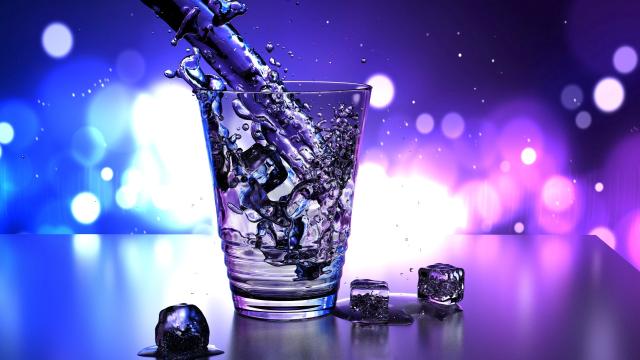Look, this is news to me, and even though I got roasted by my editors for just learning this, I bet it’s news to some of you too: You can leave a glass of water out for months, and so long as it was properly cleaned, it’s not going to make you sick.
Aw hell yeah, action shotPhoto: sutulo
It’s not like I thought water rots, OK? I just thought that there’s enough bacteria floating around a home, or in tap water, or on your lips when you take a sip, that given a month alone in a glass, it might grow and then make you sick. But, as food safety specialist Dr. Benjamin Chapman tells me in a mildly embarrassing phone call, it won’t.
But there must be some way it could, right? Yes, Dr. Chapman says, if you didn’t wash the glass properly, and left a nutrient like juice or other sugary remnants. More colourfully, he adds: “What would matter is if, like, someone had poop on their finger and stuck it in there.” Thank you, Ben.
But even if you’ve drunk out of the glass, getting your mouth on it, leaving a lip print, and then leaving out the glass — even then, he says, you’re not going to poison yourself with your own mouth bacteria.
Now, even clean water will taste bad after just a few hours. Chemist Susan Richardson told Wired that this is mostly because humans can taste more things in warm water than in cold. So as water comes to room temperature, you can taste more of the chemicals in it. And tap water’s chemical composition changes as it sits in the open air, with chemicals like chlorine “off-gassing” into the air.
Plus some of the actual water evaporates, strengthening the concentration of anything else inside the water. So the water gets “stronger,” and it just tastes different from what you’re used to, so you don’t like it.
Obviously, if the water supply is contaminated, all bets are off. If it was toxic when it left the tap, it’s still toxic after sitting out. But apparently, as long as it started out fine, even super-gross-tasting old water is healthy to drink, and I’m an ignorant hydrophobe. Fine. But I’m not alone. I only got curious because cooking blog The Kitchn asked the same question — or maybe they were stating the obvious for rubes like me.
This article has been updated since its original publication.

Comments
7 responses to “Water Doesn’t Go Off, Actually”
Are you sure that moulds and other microrganisms won’t start to grow?
Not that it matters. Half empty glasses make my houseplants happy.
For moulds and micro organisms to grow they need to be there in the first place. Plus water doesn’t have any nutrients that these bacteria would need to grow.
The thing is it’s not a sealed container (assuming we’re talking about a simple glass left on a table). So dust and other particulates will settle in it over the course of a month. Plus the horrible stuff that dust is made of, like skin particles. It’s also there for flies and other insects to land in, or geckos climbing on the ceiling to take a dump in. So, yeah, I’d be pretty reluctant to drink water that’s been sitting on a table for a month.
That’s also assuming it’s in a glass made of, well glass. Glass is wonderfully inert but other materials aren’t. Plastic and metals can leech into water if they’re used long term (though a month is probably short enough). And ceramics can be risky if they’re not properly glazed since porous surfaces are great homes for germs.
I would (and do) regularly drink water that’s been in a sealed jug in the fridge for a month or more. Part of the irony in being finicky (for me at least) is that as a kid we had water tanks. So regularly drank water that had washed off a roof covered in god knows what and sat in an old galvanised iron tank for, well years. It often looked like weak tea because it had leeched tannins from leaves (I hope it was from leaves!)
Thats moulds and microrganisms that have been introduced into the water. Water itself does not go bad.
Hydrogen and oxygen does not have an expiry date. (Not in our lifetime anyway)
Water isn’t just hydrogen and oxygen, there are alot of other things in it that make up water even is the most pure natural sources.
While water may not grow mould as suggested by the article, it will go flat as the gasses disappear over time.
This is why water doesn’t taste good the next day and feels flat.
Water is in fact only hydrogen and oxygen, and is made of absolutely nothing else.
Water may contain or be contaminated by other things, but they do not make it up.
If you’re going to correct someone, make sure you do so correctly.
On one hand you are absolutely right.
But everywhere where you can access water, consume it, drink it or put it in a glass (outside of a lab) it isn’t.
so while the molecular structure may be that the thing that we call water in 99.999% of our experience is not just those 2 molecules.
To the point that just drinking H20 will not give you the things the body needs to survive as water.
So it is worth thinking of it not just as those 2 molecules in this context or any context of where you consume it or use it.